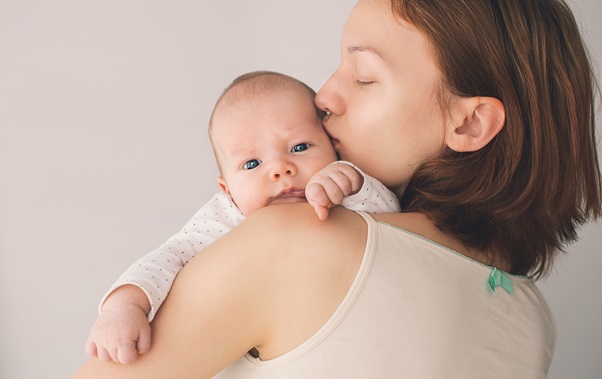
10 ways in which your baby expresses love
25 May 2022 | 5 min Read
Tinystep
Author | 2574 Articles
Quite often we wonder what’s going on in the rapidly developing minds of these tiny things we hold in our arms. Very commonly, when they show any signs of discomfort while being held, we worry it’s because they don’t like us or they’d prefer someone else to be holding them.
For all the confusion and questions we may have, here’s decoding some of the things babies do to express their affection:
1. Eye contact:
One of the creepier signs of your baby’s attraction/affection for you is when he or she makes eye contact with you. Generally, babies as young as a few weeks old, start to gaze deeply, for long periods, into their mother’s’ eyes. It shows that your baby is comfortable with you and is trying to understand you more and get to know you in the only way they can fathom. They stare intently and sort of study your face. It’s a way of familiarizing themselves with this object that provides them with love, care, and comfort (you).
2. Smile:
Between 6 weeks to 8 weeks, your baby starts to smile at you, not out of a general reflex, but with purposeful intention. This heart melting smile is one is the foremost signs of his/her love. They smile because they are genuinely happy to see you or hear your voice. Similarly, laughing while looking at you also indicates love for you. This is an indication that they prefer to be around you more than others as they understand that you can meet their needs more efficiently. You are a more preferable companion to your baby and you instigate more joy in him/her than other people. These smiles, especially when returned, helps to build and solidify the bond between you and your child.
3. Recognition:
Psychological research has found that within a few weeks, babies are able to recognise their primary caregiver, which, most often, is the mother, and respond to her more than others. This means that your baby will more easily recognize your face and voice in a situation with many people and be drawn to that. You’ll also find that your baby reacts more to your voice than anyone else’s. For example, if someone else is holding your baby and you’re talking to that person, chances are that your baby will keep his/her eyes on you when you talk or move around, regardless of who she/he is being held by. Your baby understands that you are the one who takes care of him/her and they have already formed a special bond with you.
4. Attachment:
When you’ve formed a healthy bond with your baby, it becomes evident in the way your baby responds to you. A sign of a healthy attachment with your baby is when he or she smiles when you enter the room and look at you with happiness, exceeding that seen when they look at anyone else. They will look at you as if you’re the only one lighting up the room, and this smile will definitely light up your heart! Your baby will also make joyful sounds such as giggling and attempt to reach you when you are reunited.
5. Reaching:
Another sign of affection is when your baby reaches for you or stretches out his/her arms when they see you, asking to be picked up. They want to be in your arms and prefer you to others. If they’re being held by someone else, they might even cry if they don’t get to come to you. Babies enjoy the physical proximity to the person they love or share a bond with.
6. Babbling:
Babies tend to make a lot of vague sounds. It has been found that babies tend to babble more and giggle more when they are around people they like or people who make them feel happy. If your baby tries to make baby talk with you, it’s a sign that he/she is comfortable with you and likes you around.
7. Anxiety:
Another sign of love is when your baby faces separation anxiety when he or she is separated from a parent or caregiver.they will tend to cry and be in a bad mood when the Ostend goes away or the baby is handed over to a baby sitter or dropped off at daycare. They prefer to be with you and feel discomfort when you are not around.
8. Kissing:
Older babies learn how to kiss and use this to express their affection. Starting off as open mouthed, wet kisses, they slowly master this action.
9. Imitation:
When a baby loves someone a lot they tend to mimic their actions and expressions. This is why you might notice your baby looking at you in a social situation before reacting, as they use you as an indicator of the atmosphere of the situation. This is also why you might catch your baby mirroring your facial expressions.
10. Proximity:
Once your baby is old enough to crawl, he/she would ordinarily tend to explore a lot. Babies are curious and have a lot to learn and so they tend to be on the move most of the time (when they’re not asleep). You will notice that as your baby crawls around, he/she will tend to come back to you after a while. A baby that is comfortable with you and has love for you will tend to see you as a safety zone which will keep them safe from potential dangers of the outside world.
A


Suggestions offered by doctors on BabyChakra are of advisory nature i.e., for educational and informational purposes only. Content posted on, created for, or compiled by BabyChakra is not intended or designed to replace your doctor's independent judgment about any symptom, condition, or the appropriateness or risks of a procedure or treatment for a given person.
